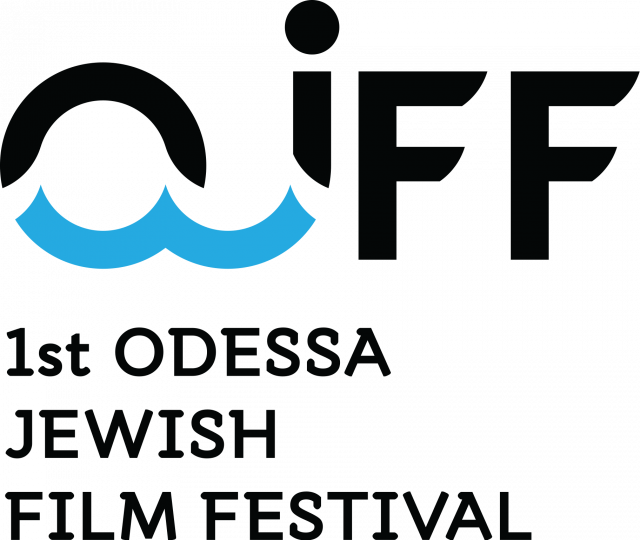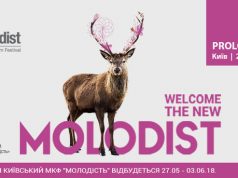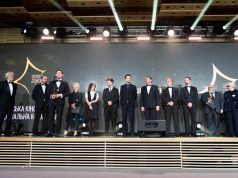On October 28th, the First Odessa Jewish Film Festival (OJFF) premiered with the French film The Jews, directed by Yvan Attal and starring Charlotte Gainsbourg in one of the main roles. More than 400 people attended the opening, the festival’s program director Gera Grudev estimates.
Grudev and his team selected 31 films from ten different countries, including arthouse, documentaries, and short films. All of them were devoted to Jewish subjects.
About a year ago, the team began to discuss organizing the festival. Jewish film festivals take place worldwide, and Odessa is one of the most important cities in Russian-speaking Jewish culture. Surely, it was time for the city to get its own festival, Grudev thought.
“We wanted to have these films here and not wait for someone to load them up on the internet,” he says. “These movies are meant to be seen on the big screen, not on a laptop at home.“
All the films were screened in the original language with Ukrainian subtitles, and all were shot in the last several years. The festival includes entries from France, Israel, the United States, Austria, Germany, Denmark, Canada, the United Kingdom and other countries.
More than 80 percent of the movies are being shown in Odessa for the first time — including a film that takes place in Odessa. That film, the French feature Friends from France (Philip Kotlarsky, Ann Vale), tells the story of Soviet refuseniks — Jews denied the right to emigrate — in Odessa in the late 1970’s. Odessans will recognize many parts of their city that still look as they did under Brezhnev.
Friends from France isn’t the only opportunity to learn about Odessa’s refuseniks at the OJFF. The festival is about more than just showing films; it is also about communication between Jews and the city’s non-Jewish residents, as well as learning about the Jewish community’s history and present. That’s why, on November 3rd — even though the festival has already ended — Odessans will get the chance to speak with Boris Khersonsky, an acclaimed poet and psychologist, about the dissident movement of the 1970’s and 1980’s, the refuseniks, and life in the Soviet Union. (The lecture starts at 7:00 p.m. in Impact HUB Odessa. There is no entrance fee, but registration is required.)
Even before the OJFF started, the celebration was underway. In mid-October, the organizers held two excursions in the city. One was called “Odessa. The Jews. Cinema,” and discussed the history of Jews in the local film industry. From the first city theater to the first film studio, one finds Jewish names in every stage of Odessa cinema’s development, Grudev explains.
Grudev is now starting to plan next year’s program: more excursions, more talks, more films (including some from the Soviet era), more retrospectives, and more producers and actors in attendance.
Ukrainian producer Konstantin Fam and German actor Lenn Kudrjawizki, who was born in the Soviet Union, were the first two filmmakers to attend this year’s OJFF. Fam, who serves on the festival’s board, is of mixed Vietnamese and Ukrainian Jewish ancestry, and has worked extensively on films on Jewish themes. The majority of the producer’s maternal relatives perished in the Holocaust, and his mother hid her Jewish background for her whole life.
In 2015, Fam played a key role in the first Moscow Jewish Film Festival. He also made the feature film Witness in memory of the victims of the Holocaust. The historical drama consists of three short films: Shoes, Brutus and Violin. The purpose of these films is to spread knowledge about history and remind people of 20th century Europe’s most central tragedy to prevent it from happening in the future.
Lenn Kudrjawizki plays one of the main characters in Violin. The actor comes from a Jewish family and grew up in Germany. There, he experienced an inner conflict and felt pulled between the family’s traditions and past and the fact that he had German friends and lived in German society.
“You have to deal with it,” Kudrjawizki says of reconciling past and present. “It may not be a matter of guilt, but one of responsibility.” At the OJFF, Kudrjawizki gave a short speech before the showing of Stefan Zweig: Farewell to Europe, in which he also performed.
Grudev believes that Stefan Zweig is a film with a lesson for everyone. First, the film shows that it is important to be optimistic, to talk about horrible events in history, like the Holocaust, in order to overcome them. Second, everyone has a special talent that he can use to make the world a better place.
For Zweig, that was writing. For Grudev, it might be organizing the OJFF. “The first festival is always a lot of work, and we know that we can’t reach everyone in Odessa with this festival. But we took the first step,” he says.
The OJFF will have to establish itself in Odessa. As soon as people understand that the event is planned for every year, more people will come, Grudev believes. “People in Berlin, New York, Warsaw and Melbourne have seen these films,” he says. “And that’s great, because we’re in a cultural context with European, American and Australian viewers — giving Odessans the opportunity, to be in one cultural context with the whole world! “
That’s one of the things Grudev wants the Jewish community in Odessa to understand: you’re not alone. There are many people around the world who are likely to have the same problems, whether issues of self-identity or inter-group miscommunication.
And this does not only apply to Jews. The festival is also interesting for people without any Jewish background whatsoever. They too can relate to the films’ themes and learn about Jewish culture.
“If I see people without a Jewish background or identity in the cinema, that’s cool!” Grudev says. “I have not met many people who are interested in Jewish culture, neither in Ukraine, nor elsewhere. I would be glad if people in Odessa would understand that Jewish culture is something interesting to think and talk about — for everybody.“
Although the team has encountered some anti-Semitic posts on its Facebook page, Grudev does not believe that this is a major issue for Jews in Odessa. In his personal opinion, one of the problems the Jewish community must face is that it keeps to itself a lot. He believes there is not enough communication between Jews and non-Jewish Odessans. One of the goals of the OJFF is to change that.
“We are not a Jewish organizations,” he says. “We are a platform that can be used by Jewish organizations and [their] representatives as well as by people who do not even know what a synagogue is. Everyone can come and talk. “
Grudev also believes that Jewish history is underrepresented in Odessa. Events like the Odessa pogrom of 1905, in which around 400 Jews were killed, are not well known. One-third of the city’s population at the time was Jewish, yet the only monument to the victims is in a Jewish cemetery, says Grudev. As a result, the non-Jewish population will not see it.
But Grudev is optimistic that this and other problems can be solved within the next few years — if people start recognizing and talking about them. The OJFF gives people of Odessa the opportunity to do just that.
The Odessa Jewish Film Festival closed on November 1st with “The Flowers of Yesterday,” a German drama starring the well-known German actor Lars Eidinger. All films were shown in the cinema “Rodina”. More information can be found on the festival’s website: ojff.eu.




































